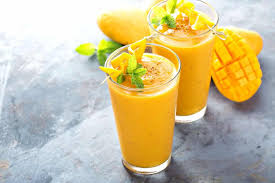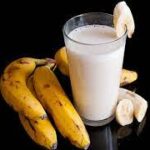Benefits Of Mango Juice: Drinking mango juice may be one of the healthiest dietary changes you can make, as this beverage is rich in vitamins, minerals, and antioxidants that can give you a healthy boost.

What is Mango Juice?
Mango juice is derived from the mango fruit, which grows on Mangifera-genus tropical trees. There are hundreds of species and cultivars of mangoes cultivated throughout the globe, but Mangifera indica and Mangifera foetida are the most common. This exotic fruit, originally from southern Asia, has been domesticated in many other tropical regions and is now one of the most sought-after fruits on the market.
Each glass of mango juice contains significant quantities of vitamin C, vitamin A, potassium, iron, various carotenoids, and potent organic acids, which are extracted by pressing or blending the soft, orange puree of the mango. Due to the juice’s potency and robust flavor, it is frequently combined with other beverages to create a more potent fruit juice concoction. Mango juice has been a part of the human diet for thousands of years, and with a little bit of effort, you can enjoy all of its health benefits by preparing it at home. Here are defining Incredible Benefits Of Mango Juice.
Benefits of Mango Juice
The most notable health benefits of mango juice include lowering blood pressure, improving circulation, enhancing eye health, bolstering the immune system, preventing cancer and chronic disease, enhancing skin health, lowering cholesterol levels, maintaining acidity levels, stimulating digestion, and managing diabetic symptoms.
Anticancer Potential
Mango varieties like Haden and Ataulfo have anticarcinogenic properties that inhibit the proliferation of lung, breast, colon, and prostate cancer, according to research conducted at Texas A&M University.
The presence of phenolic compounds in the juice, according to a 2017 study on its nutrient content, may reduce your risk of developing cancer.
Regulates Blood Pressure
Mango juice contains a significant quantity of potassium, which, due to its vasodilator properties, makes a daily glass beneficial for lowering blood pressure. This will reduce the strain on your cardiovascular system and your risk of heart attack, stroke, and cardiovascular disease.
Improves Vision
This juice contains a significant amount of carotenoids and vitamin A, which can have a direct effect on your eyesight. Vitamin A functions as an antioxidant and eliminates oxidative stress in the retina, thereby preventing macular degeneration and cataract formation.
Lowers Cholesterol Levels
In addition to bolstering the immune system, vitamin C can also act to reduce levels of low-density lipoprotein, the “bad” form of cholesterol. This further protects heart health and reduces plaque buildup in blood vessels and arteries.
Also read: Benefits of Eating Mango at Night
Improves Digestion
Mango juice has been prescribed for centuries to stimulate digestion and relieve symptoms of constipation. In large doses, this beverage functions as a laxative, but in smaller doses, it helps move stool along and lubricates the digestive tracts, relieving bloating, cramping, and gastric distress.
Reduces Acidity
Mango juice is alkaline, indicating that it has a pH greater than 7 and can help to neutralize excessive levels of acidity in the gut. If our stomach becomes too acidic, it can lead to acid reflux disease and inadequate nutrient absorption, but mango can help maintain a healthy pH level.
Manages Diabetes
In small or moderate amounts, the natural sugars contained in mangoes can help to regulate blood sugar because they are digested more slowly by the body, preventing dangerous surges and dips in glucose levels. However, if an excessive amount of mango juice is ingested, blood sugar levels can still become dangerously elevated.
Boosts Immunity
A single serving of mango juice, depending on what type of mango you use, can deliver anywhere from 60-80% of your daily requirement of vitamin C. This represents a huge boost to your immune system, as it can stimulate the production of white blood cells and work together with other antioxidants in this juice to prevent chronic disease.
Improves Circulation
Although the iron content in mango juice isn’t huge, it is enough to give a boost to red blood cell production and prevent the symptoms of anemia, such as muscle weakness, cognitive confusion, stomach issues, and fatigue.
How to Make Mango Juice?
Although mango juice is quite popular and extensively available in grocery stores, some individuals prefer to prepare their own mango juice at home, which allows them to control the amount of added sugar. If you have a juicer, the procedure is straightforward, and honey can be added if desired. However, the formula below is for those who will prepare their juice with a blender, which requires a bit more effort.




